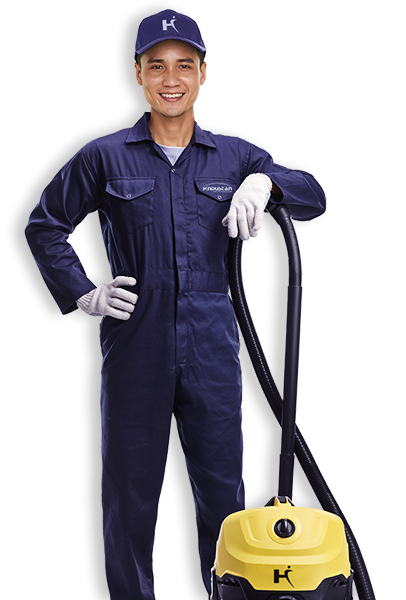In the high-energy world of culinary businesses, the commercial kitchen is more than just a hub of cooking; it’s the cornerstone where safety, hygiene, and culinary artistry converge. Maintaining this dynamic environment isn’t just about keeping up appearances; it involves a deep commitment to cleanliness and safety. This blog post delves into the essence of deep cleaning in commercial kitchens, its profound importance, and provides comprehensive insights for upholding the highest standards of kitchen hygiene.
The Essence of Deep Cleaning
Deep cleaning in commercial kitchens is an intensive process that extends far beyond the daily routine of surface wiping and dishwashing. This process encompasses:
- Thorough Equipment Cleaning: Key appliances such as ovens, grills, fryers, and refrigerators are not just cleaned on the surface but are dismantled to the extent possible for a comprehensive clean-up. Components like racks and trays are soaked in specialized cleaning solutions.
- Degreasing and Sanitizing Surfaces: Given the constant use of countertops, cutting boards, and prep areas, these surfaces accumulate grease and food particles. Proper degreasing and sanitizing are paramount to eliminate potential bacterial growth and cross-contamination risks.
- Exhaust Systems and Ventilation Cleaning: The accumulation of grease in exhaust vents and hoods is a common but hazardous issue. Regular cleaning of these systems is critical to prevent fire risks and ensure efficient airflow.
Why Deep Cleaning is Non-Negotiable
- Health and Safety Regulations: Commercial kitchens are bound by stringent health regulations. Deep cleaning ensures compliance with these standards, preventing legal and health implications.
- Cross-Contamination Prevention: Kitchens handle various food items simultaneously. Without stringent cleaning, the risk of cross-contamination can lead to severe foodborne illnesses.
- Longevity of Kitchen Equipment: Regular deep cleaning not only ensures that kitchen equipment remains hygienic but also extends their operational life, ensuring efficiency and safety.
- Fire Safety Assurance: Grease and debris build-up are significant fire hazards in kitchens. A rigorous cleaning regime minimizes these risks substantially.
Deep Cleaning Best Practices
- Scheduling and Planning: Establishing a detailed cleaning schedule is crucial. Different sections of the kitchen and various equipment require cleaning at different frequencies – some daily, others weekly or monthly.
- Choosing Appropriate Cleaning Agents: It’s essential to use the correct cleaning solutions for different types of surfaces and equipment. For example, stainless steel requires specific cleaners, and food contact surfaces need food-safe sanitizers.
- Training and Staff Engagement: Comprehensive training for all kitchen staff in deep cleaning processes is vital. It fosters a culture of cleanliness and collective responsibility.
- Regular Equipment Maintenance: Integrating regular equipment checks into the cleaning routine helps identify and address potential issues early, preventing larger problems and ensuring continuous operational efficiency.
Challenges and Solutions in Kitchen Hygiene
Managing a commercial kitchen comes with its unique set of challenges, particularly concerning hygiene and cleanliness. Addressing these challenges requires a proactive approach and innovative solutions:
- Overcoming Time Constraints: In the fast-paced environment of a commercial kitchen, finding time for deep cleaning can be challenging. Implementing a rotating cleaning schedule where different tasks are assigned each day can ensure thorough cleaning without overwhelming the staff.
- Dealing with Hard-to-Clean Areas: Areas like the insides of ovens or the back of refrigeration units can be challenging to clean. Using specialized cleaning tools and equipment can aid in effectively cleaning these areas.
- Ensuring Staff Compliance and Consistency: Maintaining consistency in cleaning standards can be challenging. Regular training sessions, clear communication of expectations, and a system of accountability can help maintain high standards.
- Budget Constraints: While deep cleaning is essential, it can be costly. Investing in high-quality, efficient cleaning equipment and supplies can be cost-effective in the long run due to reduced replacement and repair costs.
Advanced Cleaning Techniques and Technologies
As the culinary industry evolves, so do the techniques and technologies for maintaining kitchen cleanliness:
- Steam Cleaning: Steam cleaning is an effective method for sanitizing and degreasing without harsh chemicals. It’s particularly effective for hard-to-reach areas and delicate equipment components.
- Eco-friendly Cleaning Solutions: The shift towards sustainability has led to the adoption of eco-friendly cleaning agents. These solutions are not only better for the environment but also safer for kitchen staff and customers.
- Automated Cleaning Systems: Some kitchens invest in automated systems for cleaning specific equipment, like grills or hoods, to ensure consistent and efficient cleaning.
- Ultraviolet Light Sanitizers: UV sanitizers are being increasingly used to disinfect areas and equipment that are difficult to clean using traditional methods.
The Impact of Neglecting Deep Cleaning
The repercussions of neglecting deep cleaning in a commercial kitchen are severe:
- Health Risks: The most immediate impact is the risk to health. This includes foodborne illnesses and allergic reactions among customers.
- Decreased Equipment Efficiency: Dirty equipment tends to work less efficiently, increasing energy usage and repair costs.
- Reputation Damage: In the age of social media and online reviews, a single health violation can significantly tarnish a restaurant’s reputation.
- Legal and Financial Repercussions: Failing health inspections can lead to fines, legal action, and in severe cases, closure of the establishment.
Creating a Culture of Cleanliness
Building a culture of cleanliness in a commercial kitchen is about more than just rules and schedules. It involves:
- Leadership and Example: Managers and head chefs should lead by example, demonstrating the importance of cleanliness.
- Regular Training and Refreshers: Ongoing training sessions help keep staff updated on the best practices and new cleaning technologies.
- Incentivizing Cleanliness: Some kitchens implement reward systems for maintaining cleanliness standards, encouraging staff to take ownership of their work environment.
- Open Communication: Encouraging staff to voice concerns or suggestions about cleaning practices can lead to more efficient and effective cleaning routines.
Final Thoughts and Future Trends
As we move forward, the importance of deep cleaning in commercial kitchens will only grow. Trends to watch include:
- Increased Regulatory Scrutiny: Health and safety regulations are likely to become more stringent, making deep cleaning even more critical.
- Technological Advancements: The development of new cleaning technologies will offer more efficient and effective ways to maintain cleanliness.
- Sustainability Focus: There will be a continued push towards environmentally friendly cleaning practices and products.
- Training and Education: Expect to see a greater emphasis on formal training programs for kitchen staff, focusing on hygiene and cleanliness.
Conclusion
Deep cleaning in commercial kitchens is an indispensable aspect of running a successful culinary business. It’s a multifaceted task that demands attention, dedication, and a proactive approach. By embracing thorough cleaning practices, utilizing the latest technologies, and fostering a culture of cleanliness, commercial kitchens can ensure the health and safety of their staff and patrons, while maintaining their reputation for excellence in the culinary world.
In summary, deep cleaning is not just a regulatory requirement; it is a commitment to excellence and safety in the culinary industry. A well-maintained kitchen is the backbone of any successful restaurant, and deep cleaning is the key to maintaining this crucial asset.



